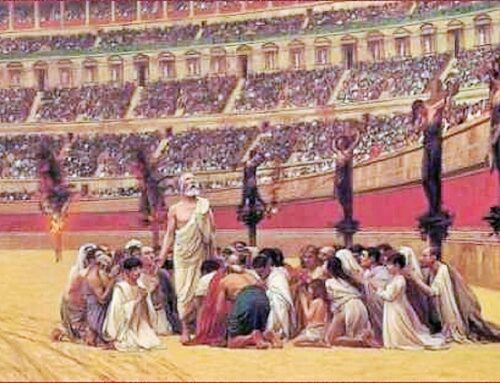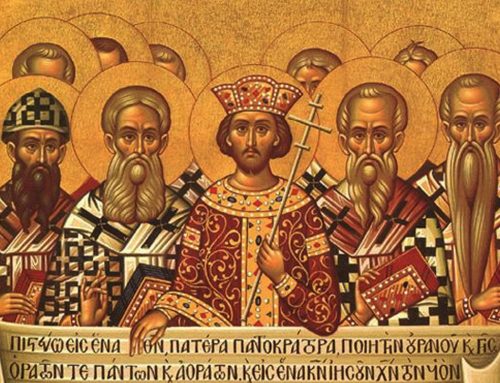THE FATHERS OF THE CHURCH: THEIR IMPORTANCE IN TRADITION and THE PATRISTIC WRITINGS OF THE EAST AND WEST
«They are described as Fathers of the Church — wrote John Paul II in his Apostolic Letter ‘Patres Ecclesiae’ (1980) – ascribed to those saints who with the strength of their faith, and the profundity and richness of their teachings, have influenced and changed the course of the first centuries».
The fourth and fifth centuries were the golden age of patristic writing. In east and west a whole series of remarkable men emerged, noted for holiness of life and outstanding work in the area of the sacred sciences and even of culture in general.
1. Introduction
History always has its protagonists and the ecclesiastic history of the Christian-Roman period had outstanding ones. The enormous effort involved in formulating dogma, as described in the last chapter, resulted from the wisdom and work of a series of exceptional personalities, who are described as ‘Fathers of the Church.’ The Fathers combined sacred science with personal holiness publicly recognized by the Church. This differentiates them from plain ‘ecclesiastical writers’, whose holiness or complete orthodoxy is not guaranteed.
The golden age of patristic writingwas the fourth and fifth century, although the term ‘the age of the Fathers’ extends to the seventh century. The western Fathers wrote in Latin; most of the eastern Fathers wrote in Greek, although others used Syrian, Coptic, Armenian, Georgian, Arabic etc. In this chapter we will refer only to the Greek and Latin Fathers whose reputations spread throughout the universal Church.
2. Eastern Fathers
2.1. St. Athanasius
The Greek patristic period opens with a writer who must be considered the founder of the science of Church history —Eusebius, bishop of Caesarea in Palestine (+ 339). Eusebius of Caesarea has been immortalized by his book Ecclesiastical History, a treasure-trove of information about the first three centuries of Christian history. A younger contemporary of Eusebius, St Athanasius (+ 373) was the main champion of the Nicene profession of faith. He devoted his life to the defence of orthodoxy against Arianism: as far as his writings are concerned, his three Discourses against the Arians deserve special mention, but the best proof of Athanasius’ dedication is the five periods of exile he underwent for his fidelity to catholic orthodoxy.
2.2. St. Basil of Cesarea, St. Gregory of Nyssa and St. Gregory of Nazianzus
- On the theological plane, victory over Arianism was won mainly by the work of three Fathers who, like Athanasius, belonged to the neo-Alexandrian school, and who are called the Great Cappadocian Fathers. They are Basil of Caesarea (330-79) and his brother Gregory of Nyssa (335-94) and their friend Gregory of Nazianzus (+ 389/390). Basil was outstanding not for his writings alone but also as an administrator and as an organizer of monastic life in the east;Gregory of Nazianzus, the ‘Christian Demosthenes’, is famous for five theological discourses in defence of the divinity of the Son and of the Holy Spirit. Gregory of Nyssa, the most profound theologian of the three, was one of the fathers of Christian mysticism.
2.3. St. John Chrysostom
Born and trained in Antioch, St John Chrysostom (344-407) is regarded by the Greek Church as its outstanding preacher and as an eminent exegete who produced commentaries on many books of the Bible. Bishop of Constantinople for six years, his homilies earned him the enmity of Empress Eudoxia and he was deposed and died in exile.
2.4. St. Cyril of Alexandria
The most famous Egyptian Father of the fifth century was undoubtedly St Cyril, bishop of Alexandria (412-44). Cyrilupheld orthodox teaching against Nestorius and, for his defence of Mary’s title of Mother of God, he must be regarded as the main mariologist among the Fathersof the Church.
3. Western Fathers
3.1. St. Ambrose
The first of the great Fathers of the west, a man of exceptional historical importance, St Ambrose(c. 339-97), produced much interesting biblical exegesis and was famous for his preaching, but he was also a man at the centre of public affairs during a time of political upheaval. Ambrose was a true Roman: this can be sensed both in his brilliant career and in his pastoral government of the see of Milan, to which he was raised by popular acclaim, when still a catechumen.
St Ambrose had the exceptional honour of conferring baptism on one who would become the most outstanding of the Latin Fathers, St Augustine. It was also his fortune to be friend and adviser to three emperors and to excommunicate one of them, Theodosius the Great, for his massacre at Thessalonica; but at Theodosius’ funeral he spoke a moving eulogy, as impressive as his one for Valentinian II, the previous emperor. Ambrose’s fame spread far beyond Milan and increased the prestige of that see not only in northern Italy but in other parts of the Latin west.
3.2. St. Jerome
The Roman west also produced the greatest student of sacred scripture: Eusebius Jerome (342-420), a Dalmatian. It should be pointed out that Jerome, like most of the Fathers of the Church, did not live a secluded life of recollection, concentrating on study and uninvolved with what was happening around him. He lived for periods in Antioch, Constantinople, Trier and Rome, and eventually settled in Bethlehem, the birthplace of Jesus.
Nor was Jerome only a researcher and scholar. He was a passionate polemicist and, through spiritual direction, energetically promoted asceticism among the women of the Roman aristocracy. Jerome is famous as a historian and exegete, but his greatest legacy was the translation of many books of the bible direct from Hebrew or Aramaic into Latin. This version is known as theVulgate: its authenticity, declared by the council of Trent, means that in matters of faith and morals it is free from error.
3.3. St. Augustine
But the outstanding Father of the Church and one of the really prominent figures in Christian history and indeed in world history, was Aurelius Augustine (354-430), from North Africa. His Confessions — a spiritual autobiography from childhood up to his conversion — is a masterpiece of world literature, which has kept its modernity century through century.
St Augustine wrote commentaries on the Old and New Testaments and made significant contributions in all the main areas of theology. A man of his time, Augustine questioned himself about the events taking place before his very eyes, particularly the collapse of the Roman empire in the west, laid waste by barbarian invasions just when it was becoming a Christian empire. Pagans interpreted these misfortunes as a punishment from the gods for abandoning the old religion. In reply, Augustine wrote The City of God, an essay on the theology of history and a treatise on apologetics in which he tried to discuss the meaning of history and the plan of divine providence.
In his old age St Augustine personally experienced the severity of his time and died in his episcopal city of Hippowhen it was being besieged by the Vandals.
3.4. St. Leo the Great and St. Gregory the Great
The Fathers of the western Church also include two popes whom history describes as ‘Great’: Leo and Gregory.
Leo I, as we have seen, played an important part in the formulation of Christological dogma. To him also is attributed much of the theology of the Roman primacy and its scriptural basis in the primacy conferred by Christ on Peter.
The other ‘great’ pope, Gregory (540-604), was a Roman already on the threshold of the middle ages. In a few centuries the world had changed a great deal: if the historical context of the first Father of the Church, Athanasius, was the Constantinian empire, the horizon of Gregory the Great was not so much distant Constantinople as Lombard Italy, Visigoth Spain and Merovingian France. Gregory’s works – the Book of Morals and the Dialogues — were avidly read in the middle ages; and ‘Gregorian’ chant lasted in the Church up to our own time.
3.5 St. Isidore of Seville
A Spaniard — St Isidore of Seville (+ 636) — can be considered the last western Father. His Etymologiae constituted the first Christian encyclopaedia and his mission can be seen as that of a teacher of the medieval west, to which he introduced the riches of the wisdom of the ancient world.
Source: Jose Orlandis (A Short History of the Catholic Church, 2001)




[…] early Eastern Church Fathers – Apostolic, Ante-Nicene, Nicene — saw this as the reason for Christ’s coming: “God […]
[…] early Eastern Church Fathers—Apostolic, Ante-Nicene, Nicene—saw this as the reason for Christ’s coming: “God became man […]